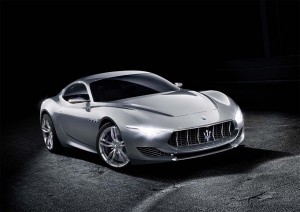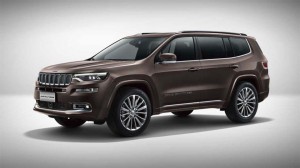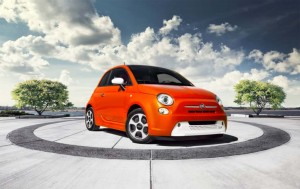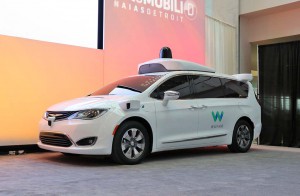
The production version of this Maserati Alfieri concept will use an electrified drivetrain to launch from 0 to 60 in barely 2 seconds.
Sergio Marchionne isn’t much of a fan of battery power, or at least he hasn’t been until recently. When Fiat Chrysler Automobiles launched its first all-electric model, five years ago, the CEO actually urged motorists not to buy it, admitting FCA lost about $25,000 on every one of them.
But at the automaker’s “Capital Day,” in Milan on Friday, Marchionne and his management team were far more upbeat, announcing plans to add dozens of electrified vehicles – everything from mild hybrids to pure battery-electric vehicles – into the FCA line-up over the next give years.
The economics still aren’t great, noted Mark Chernoby, the automaker’s head of technology compliance, but in an era of increasingly stringent emissions and mileage regulations, it’s the only real day to meet targets being set in markets as diverse as the U.S., Europe, China and Brazil. That’s all the more so as FCA continues to migrate from traditional sedans and coupes to the less efficient SUVs and CUVs that will overwhelmingly dominate its global line-up.
“You will begin to see significant applications of electrification options in the 2020 calendar-year,” said Chernoby.
Those products will use a new, modular system that can use five different motors fitted together in a variety of ways to create 12 different types of electrified drivelines, including mild, conventional and plug-in hybrids, as well as BEVs.
(For a complete look at FCA’s 5-year product plans, Click Here.)
Beyond the all-but-ignored Fiat 500e, FCA’s most significant entry into electrification is the Chrysler Pacifica Hybrid minivan. Actually a plug-in hybrid, it’s generated reasonable demand among consumers allowing many to run day-to-day errands and commutes in all-electric mode, while offering the ability to keep running once the battery drains. On Thursday, meanwhile, Google’s autonomous vehicle spin-off Waymo announced it will acquire up to 62,000 of the Pacifica Hybrids for the self-driving ride-share service it will put into commercial operation later this year in Phoenix before a national roll-out.
(Waymo planning to acquire up to 62,000 Chrysler Pacifica Hybrids. Click Here to find out why.)
The Jeep and Ram brands, meanwhile, are introducing so-called “mild hybrid” systems for their new Wrangler SUV and 1500 pickup models for 2019. And they will be followed by more advanced systems to follow.
By the end of the new five-year plan, the goal is to have some form of electrified option available on “over” 30 nameplates, FCA officials said Friday, with Jeep boss Mike Manley announcing that “all models” from that brands will offer some form of electrification. That includes a planned, all-electric version of the Jeep Grand Commander that was introduced in April at the Beijing Motor Show.

The Chinese Jeep Grand Commander will be one of the all-electric FCA models, targeting what is already the world's largest market for electrified vehicles.
China is expected to become the company’s largest market for electrified vehicles, officials explained, noting strict new regulations meant to promote the adoption of zero-emissions technologies.
Other all-electric models will include the next-generation Fiat 500e, part of a plan to shift the Italian automaker’s focus to niche products largely relying on electrified drivetrains.
But there also will be all-electric versions of the all-new Maserati Alfieri, as well as that Italian brand’s next-gen Quattroporte.
The Alfieri is the production version of a wildly popular concept vehicle that debuted at the Geneva Motor Show in 2014. It will be use an all-new aluminum spaceframe and will be offered in both hardtop and cabriolet versions. Its modular chassis will be able to handle a mix of powertrains, including a plug-in hybrid with electric all-wheel-drive capable of launching it from 0 to 100 kmh (0 to 62.5 mph) “in the 2-second range,” promised Maserati and Alfa Romeo chief Tim Kuniskis.
Going forward, all Maserati powertrains will now be sourced exclusively from Ferrari, including Maserati battery-electric vehicles. And that appears to confirm long-standing rumors that Ferrari itself will be bringing out an all-electric sports car.
Kuniskis didn’t wait to answer a question that many observers were certainly hoping to ask. Is Maserati hoping to use its new electric models to compete with the likes of Tesla and Porsche? “We are,” he declared.
As for the Alfa brand, it also will use electrified drivelines to enhance performance. That includes the upcoming Alfa Romeo 8C supercar, which will feature a hybrid drivetrain pairing a mid-mounted twin-turbo gas engine and an electric motor driving the front axle. Expect 0 to 100 kmh times of under 3 seconds. Alfa’s new GTV will also use electric boost to deliver 600 hp.
Electric propulsion was a big money loser at the time FCA launched the original 500e. Even though battery costs have plunged by 80% or more since the beginning of the decade, to around $150 a kilowatt-hour today FCA officials estimated they likely will only be able to recover about 60% of the cost of electrifying a driveline in the form of a price premium. But that prediction doesn’t hold true for all models.
Manley estimated Jeep will be able to command a steeper premium, in part, because it will use its battery-based technology to enhance the features of its SUVs. With their incredible, low-end torque, for one thing, electric motors can be especially good at rock-crawling.
At the other extreme, they add instant, off-the-line torque that can eliminate turbolag and significantly boost performance, as the preliminary specs for the Maserati Alfieri suggest. Electric motors also can improve torque vectoring on all-wheel-drive models, helping steer through, rather than push into, corners.
How consumers will respond is far from certain. All forms of electrification made up barely 3% of U.S. new vehicle sales in 2017, though demand is expected to grow sharply as new products – especially long-range BEVs – reach showrooms. And, in China, growth has been almost exponential since the new regulations went into effect. Already the world’s largest battery-car market, it is expected to become the biggest outlet for FCA battery models once they start to roll out.
(Jeep truck due in 2019. Click Here for details.)


